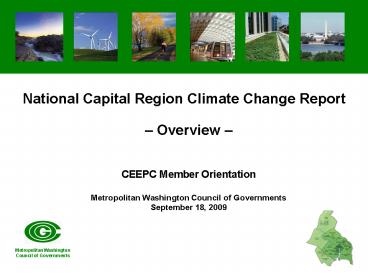National Capital Region Climate Change Report - PowerPoint PPT Presentation
1 / 14
Title:
National Capital Region Climate Change Report
Description:
National Capital Region Climate Change Report – PowerPoint PPT presentation
Number of Views:23
Avg rating:3.0/5.0
Title: National Capital Region Climate Change Report
1
National Capital Region Climate Change Report
- Overview
- CEEPC Member Orientation
- Metropolitan Washington Council of Governments
- September 18, 2009
Metropolitan Washington Council of Governments
2
COG Board Action April 11, 2007
COG Climate Change Initiative
- Through R31-07, COG Board created Climate Change
Steering Committee to - Prepare regional inventory of greenhouse gases
- Identify best practices and policies
- Examine climate change impacts
- Recommend regional greenhouse gas reduction
goal(s) - Recommend committee structure for climate change
initiative - Propose advocacy positions
- Prepare recommendations report to COG Board
3
Climate Change Steering Committee
- 18 Committee members
- Primarily elected officials from the District of
Columbia, Maryland and Virginia local governments - State environmental representatives from
Maryland, Virginia and DC - Regional transit agency (METRO), Greater
Washington Board of Trade
4
Major Accomplishments
Major Accomplishments
- Greenhouse gas emissions inventory 2005-2050
- Best Practices Report
- Emission reduction goals for 2012, 2020, 2050
- Federal/state advocacy
- Draft Report July 9, 2008
- Outreach/Listening meetings July 9 Sept. 30
- Final Report Adopted November 12, 2008
- Now implementing report recommendations
5
Best Practices Guide
- HIGHLIGHTS
- Over 2/3 of local governments in the region
purchase renewable energy - Over 1/2 of the jurisdictions have adopted energy
efficiency measures - Nearly 90 of the communities in the region have
embarked on transit oriented development and over
80 have walkable community initiatives - About 70 of communities have green space
protection and green infrastructure programs - All communities in the region have recycling
programs.
Download at http//www.mwcog.org/
6
COG Climate Change Report
- Getting Smart on Climate Change
- Climate Change, Potential Impacts on Region
- Current Projected Regional Greenhouse Gas
Emission Inventory - Regional Greenhouse Gas Reduction Targets
- Taking Action
- Energy Consumption
- Transportation and Land Use
- Economic Development Preparing for Impacts,
Financing Outreach and Education. - Moving Forward
- COG Climate Change Program
- Reference Information
Download at http//www.mwcog.org/
7
Average annual temperature in the Metropolitan
Washington Region
7
8
Measured Temperature Changes in Chesapeake Bay
Surface Waters
9
Greenhouse Gas Emissions Inventory
Total 74 million metric tonnes in 2005 Source
MWCOG 2008.
10
Example of Local Government Greenhouse Gas
Emissions
11
Adopted Regional Reduction
Goals
2012 10 Below Business as Usual 2020 20 Below
2005 2050 80 Below 2005
12
Opportunities to reduce regional GHG emissions
12
13
Selected Major Recommendations
Selected Major Recommendations
Regional Planning
- Prepare strategy to achieve 2012 regional
emission reduction goal by end of 2009 (10 below
business as usual)
- Prepare strategy to achieve 2020 regional
emission reduction goal by end of 2010 (20 below
2005)
Energy
- Explore energy audit and retrofit program.
- Promote energy efficient street lighting.
- Collaborate with utilities on regional
energy conservation program.
- Implement COG green building policy
- Implement Best Practices to reduce local
govt. energy use by 15 by 2015 - Local govts purchase 20 green power by 2015
Transportation
- Adopt Regional Green Fleet Policy
- Support California Low Emission Vehicle
Standards
- Develop regional planning process for reducing
transportation greenhouse gas emissions
Land Use
- Establish Transit-oriented development as the
regions preferred growth strategy
- Prepare plan to meet goal of increased tree
canopy in region.
14
Additional Recommendations
Additional Recommendations
Adaptation
- Research best practices to prepare for effects of
climate change. - Partner with universities to research climate
change and adaptation strategies.
- Develop a regional climate adaptation plan to
assist localities with vulnerability assessments,
adaptation planning, and emergency preparedness.
Outreach and Education
- Implement regional public education campaign and
support COG member outreach effort
- Develop partnerships with private sector and
other organizations.
Financing and Economic Development
- Explore innovative financing mechanisms for
emission reduction (Clean Energy Fund, Carbon
Offset Fund, energy performance contracting)
- Promote cooperative regional green purchasing.































